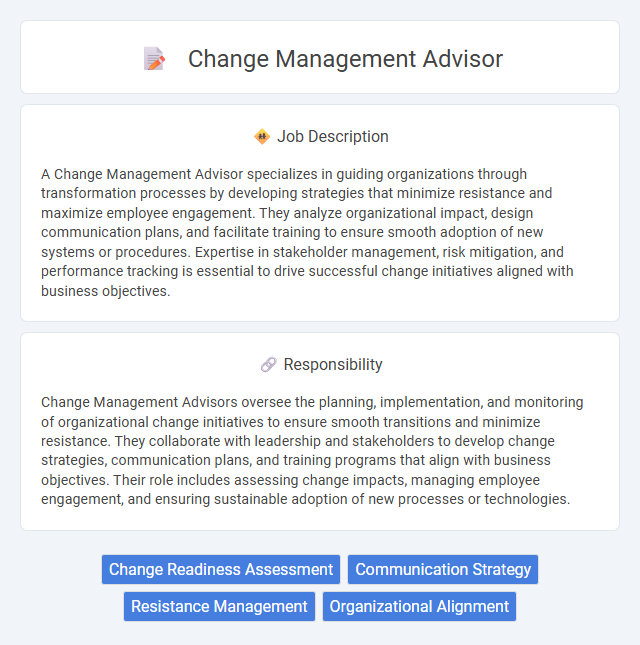
A Change Management Advisor specializes in guiding organizations through transformation processes by developing strategies that minimize resistance and maximize employee engagement. They analyze organizational impact, design communication plans, and facilitate training to ensure smooth adoption of new systems or procedures. Expertise in stakeholder management, risk mitigation, and performance tracking is essential to drive successful change initiatives aligned with business objectives.
Individuals who are adaptable, empathetic, and possess strong communication skills are likely to be suitable for the role of a Change Management Advisor. People comfortable with navigating ambiguity and influencing others without direct authority would probably find this position aligns well with their strengths. Those resistant to change or lacking emotional intelligence may struggle to meet the demands of this job effectively.
Qualification
A Change Management Advisor must possess strong expertise in organizational change theories and practical experience in leading transformation initiatives across diverse industries. Proficiency in tools such as Prosci ADKAR, Agile methodologies, and stakeholder engagement techniques is essential for driving successful change adoption. Advanced communication skills and certifications like Certified Change Management Professional (CCMP) or Prosci Certification significantly enhance the advisor's qualifications.
Responsibility
Change Management Advisors oversee the planning, implementation, and monitoring of organizational change initiatives to ensure smooth transitions and minimize resistance. They collaborate with leadership and stakeholders to develop change strategies, communication plans, and training programs that align with business objectives. Their role includes assessing change impacts, managing employee engagement, and ensuring sustainable adoption of new processes or technologies.
Benefit
A Change Management Advisor may improve organizational adaptability by guiding smooth transitions during company transformations. Their expertise likely enhances employee engagement and minimizes resistance, increasing the probability of successful project outcomes. Investing in this role often results in stronger alignment between people, processes, and technology, potentially driving long-term business growth.
Challenge
The role of a Change Management Advisor likely involves navigating the challenge of aligning diverse stakeholder interests while facilitating organizational transitions. Managing resistance to change and ensuring effective communication across all levels may present ongoing difficulties. Success might depend on the advisor's ability to anticipate obstacles and adapt strategies to evolving organizational dynamics.
Career Advancement
A Change Management Advisor plays a crucial role in guiding organizations through transformation processes by developing strategies that minimize resistance and maximize employee adoption. Mastery of change management frameworks like ADKAR and Prosci certification significantly enhances career growth opportunities, leading to senior roles such as Change Management Consultant or Organizational Development Director. Expertise in stakeholder engagement, communication planning, and data-driven impact analysis positions professionals for leadership roles within multinational corporations and consulting firms.
Key Terms
Change Readiness Assessment
Change Management Advisors specialize in conducting Change Readiness Assessments to evaluate organizational preparedness for upcoming transformations. These assessments identify potential resistance points, gauge employee engagement, and measure communication effectiveness to ensure smooth implementation. Leveraging data-driven insights, advisors tailor strategies that enhance stakeholder alignment and minimize disruption.
Communication Strategy
Effective communication strategy is essential for a Change Management Advisor to successfully guide organizations through transformation initiatives. Developing targeted messaging, stakeholder engagement plans, and feedback mechanisms ensures alignment and reduces resistance during change processes. Leveraging digital communication tools and data analytics enhances transparency and accelerates adoption of new systems or behaviors.
Resistance Management
A Change Management Advisor specializing in Resistance Management develops strategies to identify, address, and mitigate employee and stakeholder resistance during organizational transitions. By applying behavioral analysis, communication plans, and engagement techniques, they facilitate smoother adoption of changes and minimize disruption. Effective resistance management improves project success rates, enhances employee buy-in, and accelerates cultural transformation within businesses.
Organizational Alignment
A Change Management Advisor specializing in Organizational Alignment ensures that change initiatives align with the company's strategic goals and culture, facilitating smooth transitions and minimizing resistance. They develop tailored communication strategies and training programs to synchronize stakeholder expectations and enhance employee engagement throughout the transformation process. By analyzing organizational structures and readiness, they identify potential barriers and implement adaptive solutions to maintain productivity and morale during change implementation.
 kuljobs.com
kuljobs.com